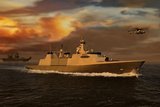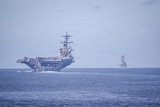Boeing maritime surveillance demonstrator takes off
The Maritime Surveillance Aircraft (MSA) demonstrator under development by Boeing has completed its first flight from Toronto’s Pearson International Airport. The four hour flight, conducted by Boeing teammate Field Aviation, was conducted to verify airworthiness.
Boeing is developing the demonstrator as a low-risk and cost-effective maritime surveillance solution designed for search and rescue, anti-piracy patrols and coastal and border security.
MSA uses technologies developed for Boeing's P-8A Poseidon programme to provide multi-mission surveillance capabilities. The baseline configuration features an Active Electronically Scanned Array multi-mode radar, an Electro/Optical/Infrared sensor, Electronic Support Measures, a Communications Intelligence sensor and Automated Identification System.
Flights will continue over the coming two months, before the demonstrator is flown to a Boeing facility in Seattle where the MSA mission systems will be installed and tested.
Field Aviation Pilot Craig Tylski said: ‘We accomplished everything we set out to achieve. The aerodynamic performance was right on the money and even with the additional aerodynamic shapes, such as the radome, the demonstrator performed like a normal aircraft. The control and handling were excellent.’
More from Naval Warfare
-
![Spain’s F100 upgrade mirrors Aegis modernisation paths in allied navies]()
Spain’s F100 upgrade mirrors Aegis modernisation paths in allied navies
The Spanish Navy’s Alvaro de Bazan-class of air defence frigates will receive the latest Aegis Weapon System technology among other modernisations to extend the service life to 2045.
-
![UK’s Fleet Solid Support ship programme deemed on track despite steel supply concerns]()
UK’s Fleet Solid Support ship programme deemed on track despite steel supply concerns
Shipbuilders are saying the programme is going ahead on time as the government estimates 7.7 million tonnes of steel are needed for 2026 infrastructure projects.
-
![As Indonesia doubles up its order, who else is looking at the Arrowhead 140 frigate design?]()
As Indonesia doubles up its order, who else is looking at the Arrowhead 140 frigate design?
The adaptable design of Babcock’s Arrowhead 140 frigate, already selected by the UK Royal Navy and Poland, has led to more orders from Indonesia while other countries continue to weigh it up.
-
![Does the increase in US firepower in the Middle East indicate another Iran strike?]()
Does the increase in US firepower in the Middle East indicate another Iran strike?
The presence of the USS Abraham Lincoln Carrier Strike Group in the Persian Gulf means additional naval and aerial capabilities, which provides the US with multiple attacking options.























